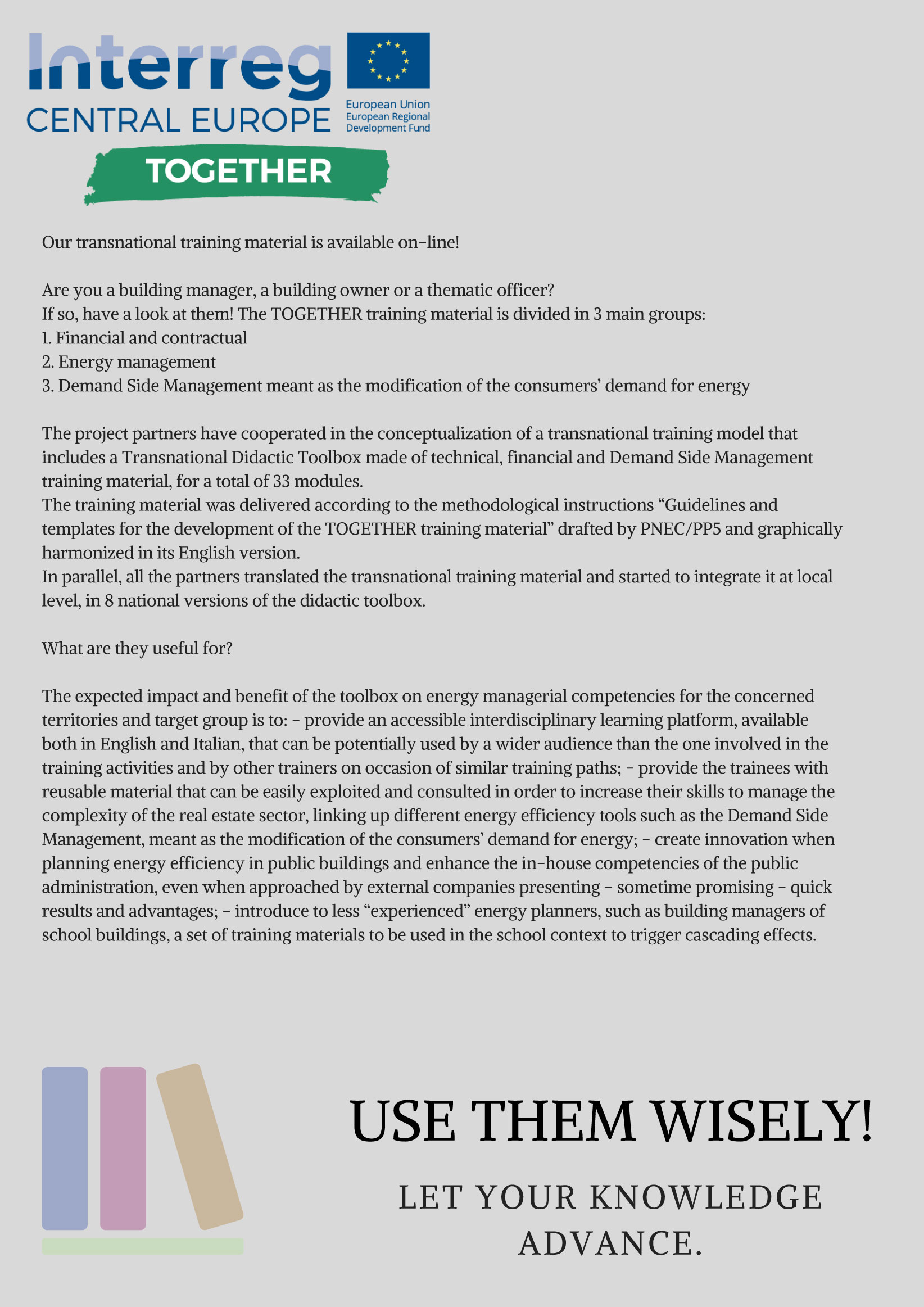Transnational toolbox on energy managing competencies

Within the TOGETHER project there were three expert partners responsible for the development of the thematic material:
The University of Maribor was responsible for the technical training material CLICK TO DOWNLOAD;
The Province of Treviso was responsible for the financial training material CLICK TO DOWNLOAD;
The City of Zagreb was responsible for the DSM training material CLICK TO DOWNLOAD.
To support them in the process, as well as to ensure comparability and integration between the three parts of the training material, PNEC developed common guidelines and templates, which were disseminated among respective partners. The document set general structure of the material, as well as the scope of each thematic part (specific topics/modules that need to be covered). An emphasis has been put on the practical exercises and case studies, which are at least as important as the theoretical introduction, as well as on building on existing experience and material, which has been gathered in the TOGETHER library. Some important suggestions from the external training experts have been also included.
Technical training set:
Objective: Increasing trainees' knowledge, skills and capacities regarding technical aspects related to EE in public buildings, with the specific focus on integration of different solutions, choosing the optimal scenarios, ensuring efficient monitoring and involving building users in the processes.
Training modules:
Module 1: Energy efficiency in buildings
Module 2: How to use energy more efficiently
Module 3: Basic characteristics of energy saving
Module 4: Energy audit and energy performance certificate
Module 5: Energy using products
Module 6: Energy retrofitting of the buildings
Module 7: Installation of RES
Module 8: Choosing the optimal EE improvement scenario for a specific building
Module 9: Integration of technical measures with each other and with other types of EE solutions
Financial training set:
Objective: Increasing trainees' knowledge, skills and capacities regarding financial aspects related to EE in public buildings, with the specific focus on the selection of most proper financing schemes, development of good quality project documentation, selection and monitoring of economic/financial indicators, involvement of building users in financing schemes (e.g. EPC contract).
Training modules:
Module 1: EU, national & regional financing schemes
Module 2: Alternative financing methods
Module 3: Economic & financial assessment of the investment
Module 4: Development of financial documentation of the project (budget, business plan, applications for funding, market analysis...)
Module 5: Ensuring project bankability, viability and profitability
Module 6: Attracting & cooperating with potential investors
Module 7: Choosing optimal funding for EE projects
Module 8: Tendering procedures and green public procurement
DSM training set:
Objective: Increasing trainees' knowledge, skills and capacities regarding behavioural and analytical aspects related to EE in public buildings, with the specific focus on:
understanding the rationale behind people's behaviours & consumption patterns, finding the most effective ways to approach building users and motivating them to change their behaviours and engage them in energy-related initiatives…
the most efficient methods & tools for monitoring energy consumption, standard and smart energy management systems, ICT technologies that may be implemented in buildings to optimise energy use…
Training modules:
Behavioural DSM
Module 1: Behavioural & psychological science related to consumers habits & practices
Module 2: Methods & tools for communicating and cooperating with building users
Module 3: Development of successful educational & information campaigns addressed at building users
Module 4: Methods & tools for changing habits and behaviours of building users
Module 5: Different incentive schemes for energy saving
Module 6: Monitoring of building users' behaviours
Module 7: No-cost and low-cost energy saving measures
Module 8: Integration of behavioural measures with other EE solutions
Analytical DSM
Module 1: Collection, analysis, verification and presentation of the consumption data
Module 2: Development of energy-related data bases
Module 3: Standard energy monitoring/management systems
Module 4: Smart energy monitoring/management systems
Module 5: Advanced energy management systems (e.g. BEMS)
Module 6: Using ICT to analyse and reduce energy consumption in buildings
Module 7: Practical use of monitoring data - development of energy optimisation and adaptation scenarios
Module 8: Practical use of monitoring data - educating and involving building users
The TOGETHET transnational training model highlights the necessity of combining theoretical knowledge with practical skills. Therefore in each case the training module includes:
theoretical introduction in word
theoretical introduction on ppt slides
at least one practical exercise / group works
check list
further suggestions for trainers, including:
- suggestions on further reference material (link to the TOGETHER library)
- suggestions on further relevant topics
- suggestions on further exercises/practical application